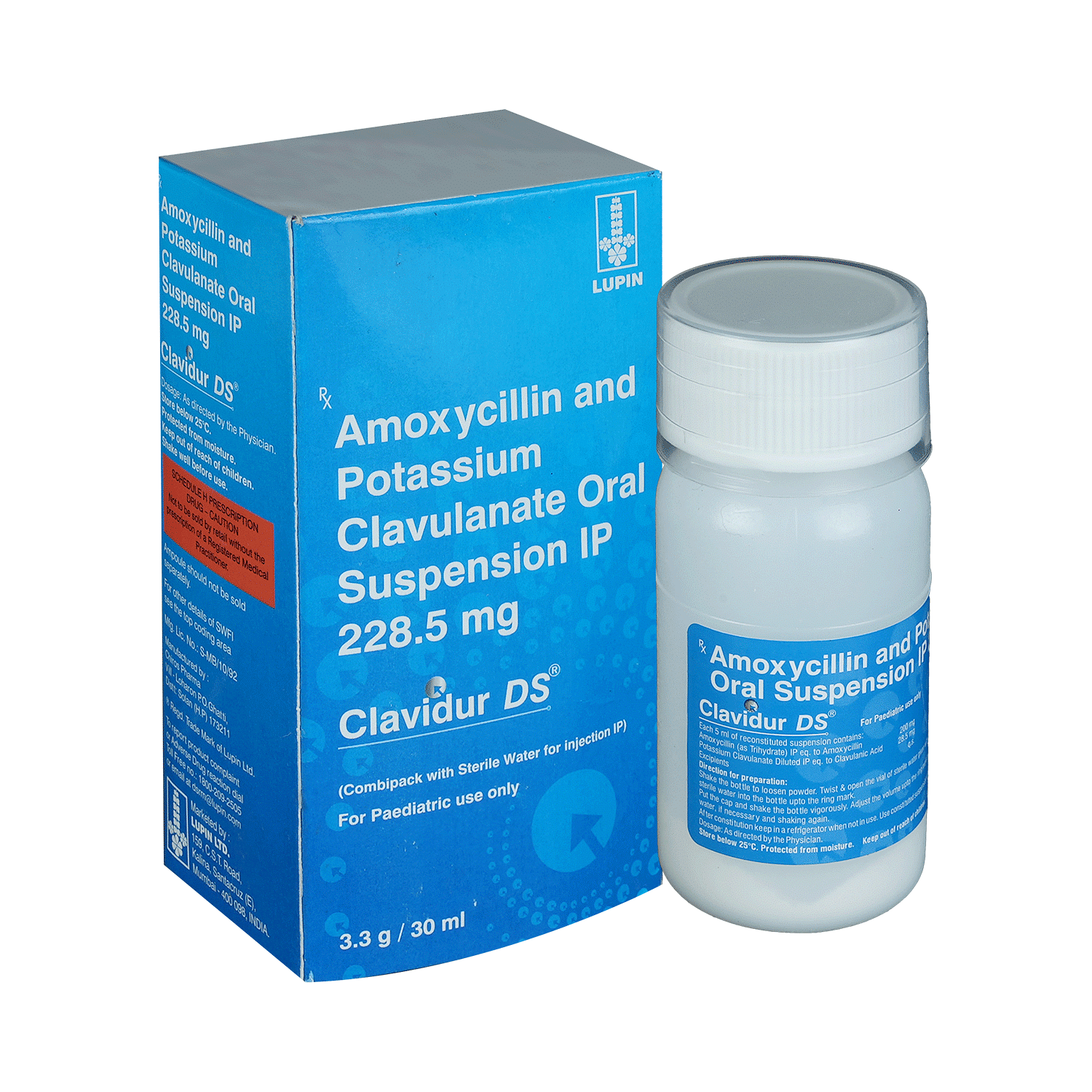
Volmox CV Syrup
Manufacturer
Events Pharma
Salt Composition
Amoxycillin (200mg) + Clavulanic Acid (28.5mg)
Key Information
Short Description
Volmox CV Syrup is an antibiotic medicine that helps treat bacterial infections of the ear, nose, throat, chest, lungs, teeth, skin, and urinary tract.
Dosage Form
Syrup
Introduction
Volmox CV Syrup is an antibiotic medicine that helps treat bacterial infections of the ear, nose, throat, chest, lungs, teeth, skin, and urinary tract. It is capable of killing bacteria that have become resistant to other therapies and thus also helps treat tuberculosis that is resistant to other treatments.
Directions for Use
Your child must complete the entire course of antibiotics. Stopping too soon may cause the bacteria to multiply again or cause another infection.
How it works
Volmox CV Syrup is an antibiotic. It has two active agents amoxycillin and clavulanic acid. Amoxycillin works by preventing the formation of the bacterial protective covering (cell wall) essential for the survival of the bacteria. Whereas clavulanic acid serves a special purpose of inhibiting an enzyme (beta-lactamase) that is produced by resistant bacteria. This makes the combination of amoxycillin and clavulanic acid an effective line of treatment for many types of infections.
Quick Tips
Your child must complete the entire course of antibiotics. Stopping too soon may cause the bacteria to multiply again or cause another infection. Encourage your child to drink plenty of water in case diarrhea develops as a side effect. Never give Volmox CV Syrup until and unless prescribed by the doctor. Do not give Volmox CV Syrup to treat common cold and flu-like symptoms caused by viruses. Check ‘expiry’ before giving Volmox CV Syrup to your child. Immediately discard all the expired medicines.
Related Medicines

Biclopen CV Syrup

Bmxclav Syrup

Clavet Syrup

Nable DS Syrup

Clavidur DS Syrup

Amc Syrup

Knollclav CV Syrup

Clavflow Syrup

Fitclav Syrup

Amoxmed DS Syrup
Frequently asked questions
Can other medicines be given at the same time as Volmox CV Syrup?
Volmox CV Syrup may interact with other medications or substances. Please inform your child's doctor about all medications your child is currently taking before starting Volmox CV Syrup. It is essential to consult with your child's doctor for safe dosage adjustments and potential interactions.
Can I get my child vaccinated while on treatment with Volmox CV Syrup?
Generally, antibiotics do not interfere with vaccine ingredients or cause negative reactions in children recently vaccinated. However, vaccination should be delayed until your child has recovered from an illness and is symptom-free, unless specifically recommended by the doctor.
Which lab tests may my child undergo while taking Volmox CV Syrup on a long-term basis?
Periodic kidney and liver function tests may be conducted during prolonged treatment with Volmox CV Syrup to monitor your child's health status. These tests will help assess the medication's impact on these vital organs.
Can I give a higher than the recommended dose of Volmox CV Syrup to my child?
Giving a dosage exceeding the recommended amount of this medicine can increase the likelihood of side effects. If your child experiences increased symptom severity, consult with their doctor for re-evaluation.
Can I stop giving Volmox CV Syrup to my child when the symptoms are relieved?
No, do not discontinue treatment without consulting your child's doctor. Even if you perceive improvement, continue the medication as prescribed to ensure complete cure. The symptoms may improve before the infection is completely eradicated.
Can the use of Volmox CV Syrup cause diarrhea?
Yes, diarrhea is a possible side effect of Volmox CV Syrup. It is because the antibiotic targets and kills harmful bacteria. This medication may also affect the beneficial bacteria in your child's gut, leading to diarrhea. In case of diarrhea, encourage your child to drink plenty of fluids or other beverages. If the diarrhea persists and you notice signs of dehydration (e.g., decreased urination with dark-colored and strong-smelling urine), consult a doctor before administering any additional medication.
Do all viral common colds result in secondary bacterial infection?
While most cases of viral cold infections don't develop secondary bacterial infections, it is important to understand that antibiotics are only necessary when there is a confirmed bacterial infection. If you have any doubts about your child's illness or potential bacterial involvement, always consult with their doctor.
The mucus coming out of my child’s nose is yellow-green. Is it a sign of a bacterial infection?
Yellow or green mucus in the nose does not automatically indicate the presence of bacteria. It is normal for mucus to thicken and change color during common colds, usually lasting for 7-10 days. While sometimes a bacterial infection may be present, this condition does not always require antibiotics.
Is there any sign which shows that my child needs immediate medical attention?
In case of severe allergic reactions (breathing difficulties, skin rashes), gastrointestinal infections (diarrhea), or liver damage (weakness, paleness, vomiting) – seek immediate medical attention. These are rare but potentially serious side effects and require expert intervention.


